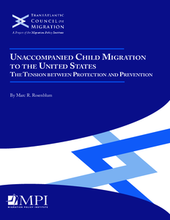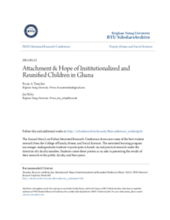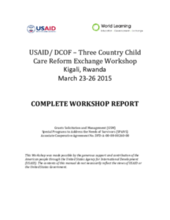Demographic Data
|
Sources: World Bank, UNDP, UNAIDS, DHS 2013 |
Displaying 11531 - 11540 of 14391
This study was aimed at assessing growth and developmental outcomes of children living in orphanages in Odisha, India aged birth to 72 months and to make recommendations for “possible remedial measures” for addressing poor growth and developmental outcomes for children in institutions.
This report provides a general background to the demographic makeup of the population of unaccompanied minors who have migrated to Sweden, including an examination of their educational and employment characteristics.
This report examines the policy challenge in the United States of balancing protection and immigration enforcement in the recent unaccompanied child migration “crisis” in the US.
This brief from Mathematica Policy Research presents findings from the Informal Caregivers Research Project on informal caregivers’ and parents’ networks in the US. The research focuses on child care arrangements and sources of support and information related to caregiving.
This brief from the Future of Children Journal, a collaboration of the Woodrow Wilson School of Public and International Affairs at Princeton University and the Brookings Institution, outlines the current state of the Child Welfare System in the United States, particularly federal funding to individual states’ child welfare systems.
This poster provides a brief overview of research conducted in Ghana to examine how institutionalized children’s hope for the future may be impacted by perceived social attachments.
This one-page presentation outlines the research questions, data, methods, results, literature review, discussion and implications of a study that looked at the effects of a child’s relationship to head of household, age, and orphan status on the severity of discipline they receive in Ghana, Iraq, Costa Rica, Vietnam,and Ukraine.
Anglicare, a welfare organization in Australia, is calling for a drastic change in the foster and state care systems, says the article. The organization is advocating for foster care funding to be extended to 21-year-olds.
Better Volunteering, Better Care consultant, Anna McKeon, gave an interview for Sharing4Good about orphanage volunteering. In the interview, she discusses how she became involved in the issue of orphanage volunteering, defines orphanage tourism and its potential harms, identifies common motivations for orphanage volunteering, lists the countries where it is most problematic, and proposes some solutions or alternatives.
The United States Agency for International Development (USAID) through its Displaced Children and Orphans Fund (DCOF) supported a sub-regional workshop held in Kigali March 23-26, 2015 to provide structured opportunities for technical exchange on care reform, approaches, methods, and tools. This report summarizes the activities and discussions from the workshop.








